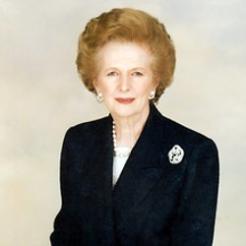The former PM and the banker's actions faced consequences in different generations. Robert Ashton discusses their very different responses to a problem born from a shared interest.
What do Margaret Thatcher and James Crosby have in common? Not a lot I hear you say; for one thing Thatcher has just died and Crosby is very much alive. But what they shared is a passion for capitalism in its purest form. How they both responded to public pressure in their respective ways and days is what interests me most. Because that illustrates to me, as well as to you perhaps, the extent to which public opinion is taken seriously.
According to Wikipedia, UK GDP grew by more than 23 per cent during Margaret Thatcher's Downing Street reign. Public spending grew also, up by 33 per cent on health and perhaps not surprisingly, by more than 53 per cent on law and order. She wound up the country in more ways than one, as those of you old enough to remember will know.
I am not an economist, and so cannot comment on the decisions she made. I did have to live with a mortgage interest rate of 16 per cent for some time; that was scary. I also travelled a lot around Nottinghamshire in 1984, when there were up to 8,000 police chasing flying pickets from pit to pit; that was scary too. And then of course we had the poll tax riots and a war with Argentina.
Yet however strong the public opposition; however big the bill for police overtime, Margaret Thatcher stuck to her guns; at times, literally! She did not feel the need to respond to criticism. Instead she ignored it and ploughed on regardless.
Contrast that with James Crosby's recent statement. He left HBOS in 2006 with a knighthood and a £580,000 a year pension. The recent Parliamentary Commission on Banking Standards described him as an "architect of the strategy that set the course for disaster". Within days he offers to hand back his knighthood and 30 per cent of his pension.
Crosby didn't have to do anything. He could, as Thatcher would have done, ridden the storm. But instead, seven years after leaving HBOS he felt moved by public opinion, as well perhaps by his own conscience to make a very public sacrifice. That is something Margaret Thatcher never, ever did.
So what Thatcher and Crosby had in common was the capitalist ideal; profit at all costs. They were separated however by a generation. Their recent coincidental appearance on the front pages of our national newspapers, illustrates just how much attitudes have shifted over the last 30 years.
Today people in powerful positions respond to public pressure. Today conscience matters and that is why, increasingly, our society will become more responsible, inclusive and fair. For those of us working at the frontline of social need, the current national austerity can make the future look very bleak.
But move the starting point back 30 years and then project it forward, and you begin to see a far more satisfying trend. Perhaps we are already more than halfway from a very bleak past to a very satisfying future.










